UK’s Sunak Urges Iran To De-Escalate After Biden Threat
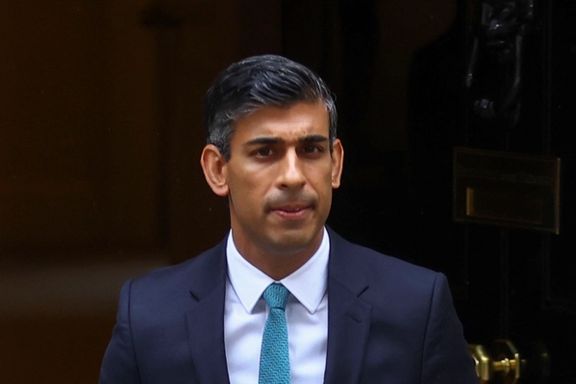
UK Prime Minister Rishi Sunak has urged Iran to de-escalate tensions in the Middle East after a drone attack by Tehran-backed forces killed three US soldiers in Jordan.

UK Prime Minister Rishi Sunak has urged Iran to de-escalate tensions in the Middle East after a drone attack by Tehran-backed forces killed three US soldiers in Jordan.
“We are concerned and would urge Iran to continue to de-escalate tensions in the region…We absolutely condemn what has happened over the past couple of days,” Sunak said on Monday.
US President Joe Biden on Sunday vowed to retaliate against the attack, as lawmakers and former US officials expressed outrage at the deadly attack, which they see as an Iranian declaration of war.
Britain, the closest US ally in Europe, joined the United States this month in launching retaliatory strikes against Yemen’s Houthi forces, armed and supported by Iran. The Houthis have been attacking international maritime traffic in the Red Sea since mid-November, after Iran’s Supreme Leader Ali Khamenei called on Muslim countries to blockade Israel.
Sunak expressed his concern as the world expects an imminent US retaliatory attack possibly in Syria, Iraq or even at Iranian targets.
“We stand resolutely with our allies to bring stability and peace to the region…And that’s what we’ll continue to work towards,” the Prime minister said.
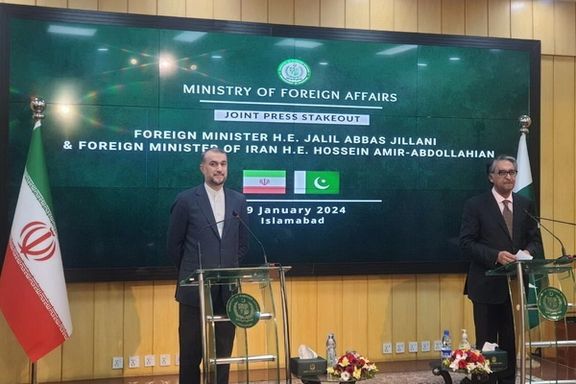
Iranian Foreign Minister Hossein Amir-Abdollahian has pointed fingers at third countries for supporting militants in the border regions of Pakistan and Iran.
Addressing a joint press conference alongside Pakistan’s Interim Foreign Minister Jalil Abbas Jilani in Islamabad on Monday, Amir-Abdollahian asserted, "There is no doubt that the terrorists located in the common border regions and areas of Iran and Pakistan are led and supported by third countries and they never favor any good action in line with the benefits of the Iranian and Pakistani governments and nations."
Amir-Abdollahian's visit to Pakistan follows escalating tensions triggered by an Iranian missile strike in Pakistan earlier this month, prompting Islamabad to launch a similar attack against what it said were terrorist hideouts in Iran's Sistan-Baluchestan province. The situation worsened with the recent killing of nine Pakistani workers by unidentified assailants in the same region, further straining relations between the two nations. Pakistan has called for a thorough investigation and prosecution of those responsible for the attack.
For his part, interim Foreign Minister Jilani acknowledged terrorism as a mutual challenge for both countries and stressed the importance of respecting each other's sovereignty and integrity as a fundamental step towards cooperation.
Iran and Pakistan maintain a turbulent yet functioning relationship. Border clashes, often involving groups like Jaish al-Adl, have sporadically erupted, with the militant organization claiming responsibility for attacks on Iranian border patrols.

The fifth and concluding trial session of Johan Floderus, a 33-year-old Swedish citizen and diplomat of the European Union, was held in Tehran.
Floderus has been detained by the security forces of the Islamic Republic since April 2022 on what appears to be trumped up charges of espionage.
According to reports from Fars News Agency, affiliated with the Revolutionary Guards, the session took place on Sunday at the Tehran Revolutionary Court. The judge reiterated charges against Floderus, including "corruption on earth through actions against national security," "assembly and collusion with the intention of committing a crime against national security," and "intelligence cooperation" with Israel.
The judge based the accusations on reports from Iran's security apparatus, along with evidence such as Floderus’ presence in Iranian border cities and his travels to various countries, including Israel.
During the session, the prosecutor's representative urged for the strictest punishment for the Swedish citizen. Floderus and his legal team have been granted one week to present their final defense statement to the court.
Floderus, a graduate of Oxford University, previously served in the Afghanistan desk of the EU’s external services department. His detention is seen by observers as potentially linked to Tehran's efforts to exert pressure on the Swedish government. The pressure could be aimed at securing the release of Hamid Nouri, a former judicial official of the Islamic Republic, who has been sentenced to life imprisonment for involvement in the massacre of political prisoners in the 1980s, in which up to 5,000 were executed.
The Stockholm Court of Appeals upheld Nouri's life sentence in December.
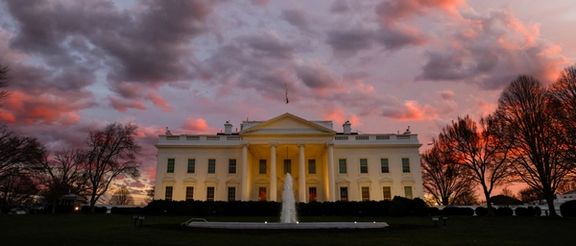
President Joe Biden is under increasing pressure to retaliate against Iran following an attack by Iran-backed militias that killed three US soldiers and wounded 34.
US troops in Iraq and Syria have been facing constant missile and drone strikes since last October when Israel began its onslaught on Gaza in response to Hamas’ rampage of the Israeli border communities. This is the first time, however, that such strikes have resulted in loss of American life – which many in Washington consider to be a red line.
The loss of life, after repeated warnings by his Iran policy critics, has left Biden with very little option but to escalate.
Biden and Secretary of Defense Lloyd Austin vowed Sunday evening to “hold all those responsible to account,” pointing out in clear terms who they had in mind. “We know it was carried out by radical Iran-backed militant groups operating in Syria and Iraq,” Biden said.
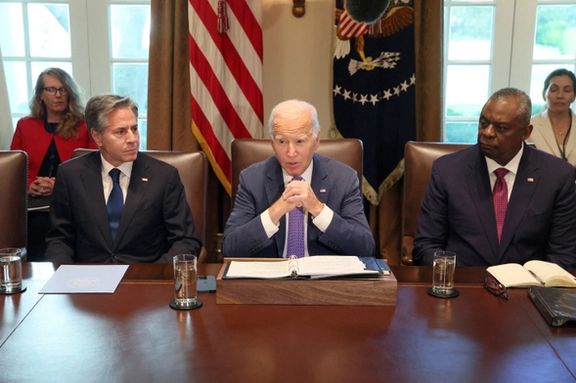
Tehran claimed innocence almost immediately, continuing its policy of 'plausible deniability.' “Iran has nothing to do with these attacks,” Iran’s official news agency IRNA quoted the country’s UN representative as saying. “The hostilities are between the US army and the resistance forces in the region that are engaged in tit-for-tat attacks.“
This message is unlikely to be taken seriously at the Pentagon or the White House, though, where, according to various reports, top level deliberations were underway Sunday evening to decide on an appropriate response.
But what would that response be?
“Washington could sink the Iranian navy, like then President Ronald Reagan did in the 1980s,” wrote Matthew Kroenig, vice president of the Atlantic Council. “It could strike Iranian naval bases. It could target Iranian leadership, following in the footsteps of then President Donald Trump’s killing of Iranian General Qassem Soleimani.”
That is in fact the incident many cite to argue that Biden’s fear of Iran’s retaliation is unfounded, since, the argument goes, the regime’s “hard revenge” for Soleimani was no more than a missile strike on a US base with enough notice for the personnel to evacuate.
A more controversial, and perhaps less likely, response could be to target Iran’s “nuclear and missile program,” Kroenig suggested, “which must be addressed soon regardless, as the Pentagon estimates its nuclear breakout timeline to be only twelve days.”
Any such scenario, and many more being discussed in US media, would be harsher than what President Biden has ever countenanced. But it has been that very unwillingness to be tough, his critics say, that has led to the loss of American life –and to this fateful moment for Biden’s political fortunes in an election year.
“The sorry truth is that these casualties are the result of the President’s policy choices,” reads the Wall Street Journal’s editorial Monday. “The President has put his anxieties about upsetting Iran and risking escalation above his duty to defend U.S. soldiers abroad.”
This is perhaps as harsh a criticism as a US President can get. And yet it's become so strikingly commonplace in Joe Biden’s case.
Questions are also being asked as to why the air defense systems at the US base (T-22 in northeast Jordan, bordering Syria) did not detect or shoot down the drone(s). According to the latest reports, 8 of the 34 injured soldiers have been airlifted to another country for treatment.
Any further loss of life could intensify pressures on the Biden administration to confront Iran directly, especially in an election year, with Donald Trump as the likely opponent, who, not surprisingly, is making the most of Biden’s predicament.
“Three years ago, Iran was weak, broke, and totally under control,” Trump said in a statement Sunday night. “Then Joe Biden came in and gave Iran billions of dollars, which the Regime has used to spread bloodshed and carnage throughout the Middle East. This attack would NEVER have happened if I was President, not even a chance.”
Many other Republicans also attacked Biden and his team for “appeasing” the regime in Iran and allowing it to undermine American interests in the Middle East undeterred.
“The only answer to these attacks must be devastating military retaliation against Iran’s terrorist forces,” Senator Tom Cotton said in a statement. “Anything less will confirm Joe Biden as a coward.”.
Many other GOP heavyweights joined in on the attack on the President , including minority leader Senator Mitch McConnell, the Armed Service Committee member Senator Rick Scott, and the committee’s Ranking Member Senator Roger Wicker.
“We must respond to these repeated attacks by Iran and its proxies by striking directly against Iranian targets and its leadership,” Wicker posted on X. “The Biden administration's responses thus far have only invited more attacks. It is time to act swiftly and decisively for the whole world to see.”
Some Democrats also called for action, in a clear sign of the hardening of moods on the Capitol.
“Every single malignant actor responsible must be held accountable,” the House minority leader Hakeem Jeffries wrote on X.
President Biden has said that the United State would retaliate at a time and in a way that it sees fit. If the mood in Washington is any indication, the response should be hard and delivered early.
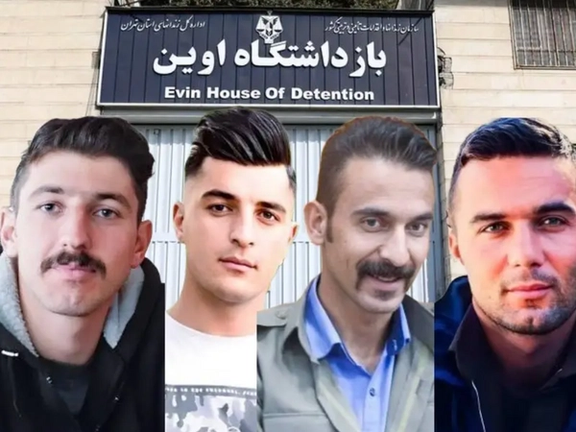
The Islamic Republic's regime has executed four Kurdish political prisoners that it accused of involvement in a plot to bomb an Iranian defense facility.
The four prisoners, Pejman Fatehi, Mohsen Mazloum, Mohammad (Hazhir) Faramarzi and Wafa Azarbar, were executed in Ghezel Hesar Prison in Karaj, west of Tehran, on Monday morning (local time), according to the Islamic Republic's Judiciary.
Their families had earlier been summoned to Evin Prison for a meeting in a sign of imminent execution. They were later transferred to Ghezel Hesar to be hanged.
Iran's Intelligence Ministry had announced their arrest in mid-2022, claiming that they had "illegally entered Iran from Iraqi Kurdistan and intended to bomb a Defense Ministry facility used for producing equipment."
The Judiciary's website said in a statement on Monday that they had been recruited by Israel's Mossad through the Kurdish group Komala to bomb the Defense Ministry facility in Najafabad, Isfahan Province, on July 23, 2022.
"In order to get prepared for the operation, they were sent to African countries several times and were trained in their military bases in the presence of Mossad officers," the Judiciary's news agency said.
"Even the Mossad chief David Barnea participated in one of the training sessions and delivered a speech to boost their morale," the Judiciary's report claimed.
The Norway-based Iran Human Rights NGO strongly condemned the execution of the four political prisoners and called on the international community to break its silence regarding the wave of executions in Iran.
The NGO also called on Nada Al-Nashif, the UN Deputy High Commissioner for Human Rights, to cancel her upcoming trip to Iran in protest to the executions.
Mahmoud Amiry-Moghaddam, the director of Iran Human Rights NGO, said, "The execution of these four prisoners was based on confessions obtained under torture and without a fair trial, and are considered extrajudicial killings for which Khamenei and the corrupt judiciary of the Islamic Republic must be held accountable."
He further noted that "the international community must show a practical response to the rampant and daily executions by the Islamic Republic, and the smallest response from the UN High Commissioner for Human Rights to these executions would be the cancellation of Nada Al-Nashif's trip to Iran and cessation of dialogue with the authorities of the Islamic Republic."
Footage aired on state television in October and December 2022, purportedly depicted the four men confessing to planning a bomb attack near the central city of Esfahan, allegedly under Israeli intelligence guidance. Political and security prisoners in Iran are denied transparent and fair trials, often without their own defense attorneys.
The Islamic Republic, which has the highest rate of executions in the world after China, has executed 90 people just from December 22 to January 21.
In a recent revelation, UN experts disclosed that at least 834 people were executed in Iran in 2023, with eight of them linked to nationwide protests. The experts urgently called on the Iranian government to halt the surge of executions and undertake a comprehensive review of the use of the death penalty.

An Israeli cabinet minister has announced plans to initiate efforts to bring a case against Iran to the International Court of Justice, focusing on charges of genocide.
Gideon Sa'ar highlighted that Iranian leaders have openly advocated for the destruction of Israel and provided significant support to Hamas and other Gaza-based terrorist groups responsible for the October 7 attacks.
Experts in international law suggest that the massacres and other crimes committed by Hamas on October 7 could potentially be categorized as a genocidal act. This is because they appear to have been aimed at the destruction, “in whole or in part”, of a national group, specifically Israelis.
“There are public statements by senior Iranian officials in favor of destroying Israel,” Sa’ar told the Kan public broadcaster.
“Iran finances, arms, and trains all the jihadi terrorist organizations including Hamas and Islamic Jihad which carried out October 7, so in my opinion there is an abundance of evidence which can be submitted to the court in the Hague,” added Sa’ar, a former justice minister.
“Israel is a small and persecuted nation that is fighting for its life and at the same time is fighting on the international stage for its right to self defense. It is a nation that is truly at risk of genocide given that there are enemies around it that declaredly want to destroy it,” he underlined.
The Iranian regime frequently issues threats against Israel. Despite the threats, Tehran has not directly attacked Israel but continues to support its proxies in the vicinity of Israel, especially after Hamas’ surprise attack on Israel on October 7 which killed more than 1,100 Israelis, mostly civilians.